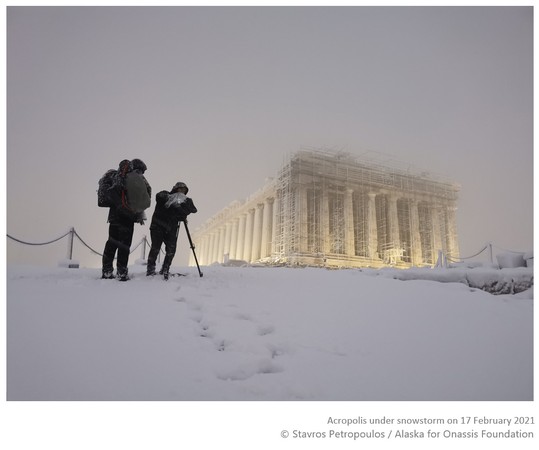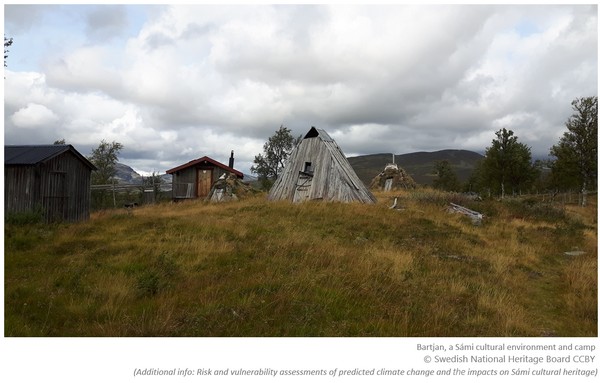Press Releases
07-09-2022 15:11
Publication of the report “Strengthening cultural heritage resilience for climate change. Where the Green Deal meets cultural heritage”
The Department of Antiquities of the Ministry of Transport, Communications and Works announces the publication of the final report of the EU Open Method of Coordination (OMC) group of Member States’ experts, titled “Strengthening cultural heritage resilience for climate change. Where the Green Deal meets cultural heritage”. Based on the Open Method of Coordination, which is an EU policymaking process used by Member States to cooperate at European level, this group’s mandate was to identify the impacts of climate change on cultural heritage and subsequent gaps. It also involved the examination of the ways in which cultural heritage can contribute to the European Green Deal and to addressing the broader threats of the climate crisis by providing sustainable solutions.
As cultural heritage is of invaluable importance for the identity and integrity of Europe and its citizens, it is imperative to take action for its protection. Additionally, the EU and its Members States have agreed in the Treaty of Lisbon (Article 3) to safeguard cultural heritage. This OMC group was created upon this necessity, with the aim of bringing together, for the first time, experts from twenty-five (25) EU Member States and three (3) associated countries to cooperate at European level on the application of climate action to cultural heritage. The research conducted by the group primarily documented theaccelerating terrible impacts of the changing climate that threaten all forms of cultural heritage. The report also highlights the critical lack of policies and action plans both on European and national level that would mitigate these negative impacts.
"Europe can be proud about its rich and diverse cultural heritage. We can be proud about our worldwide pioneering role in research and innovation to protect cultural heritage from the impacts of climate change. However, we must do more and quickly - with the help of cultural heritage we can transform also our economic model to become a greener, sustainable climate resilient society" said Commissioner Gabriel.
The full report together with an Executive Summary and the ten recommendations put forward by the group of experts is available at https://doi.org/10.2766/44688. Other key findings of the report draw on the urgency to establish and implement suitable strategies to improve resilience by including cultural heritage in all mainstream policies, from climate action and energy policies to fiscal, stability policies and growth; it has also been identified that by supporting the preservation of monuments and sites we contribute to climate protection, as does the continuous maintenance and reuse of old buildings, instead of demolition. The revitalisation and use of traditional and forgotten skills and techniques can make substantial contributions to the greening of Europe and stimulate economic recovery. Furthermore, cultural heritage needs to be systematically included in the national education systems, while national research programmes need to be set up to develop protection measures against climate change. Another aspect highlighted in the report is the immediate necessity to raise awareness for cultural heritage in times of climate crisis at all levels, the political decision-making level, the wider society and among heritage communities.
According to Dr. Johanna Leissner, chair of the OMC group and delegate of Germany, “The group collaborated and joined forces in a truly European spirit. It was a great honour and unique opportunity for all of us to work together in such a critical time and on such a pressing issue. On the one side we were shocked about the unprecedented speed and scale climate change threatens our cultural heritage, on the other side we found many answers that cultural heritage can contribute to solve the climate crisis and how we can sustain our European cultural heritage for future generations”.
The pioneering role of the EU is well reflected in the centrepiece of the group of experts’ work, as it became possible, for the first time, to collect 83 best practice examples from 26 countries from each corner of Europe. All types of tangible and intangible cultural heritage are covered: buildings and monuments, museum collections, archaeological sites, cultural landscapes and historic gardens, traditional skills and knowledge, underwater heritage, etc. These best practices are an incredible source of inspiration and creativity for climate change decision-makers, but also for heritage professionals, craftsmen, and educators, on how to address the threats posed by climate change to cultural heritage. They have also uncovered the tremendous role of research to protect cultural heritage from climate change and encouraged the application of heritage-based green and sustainable solutions to fight against the climate crisis.
This report demonstrates a strong commitment from the highest political level of the EU to support cultural heritage in the fight against climate change. It also underlines that Europe is the leader in research against the impacts of climate change. Given the increasing threats imposed by climate change and the realisation that cultural heritage is part of the solution, it is of immense importance to acknowledge that it comprises an essential tool in our common struggle to adverse the destructive consequences of this crisis. This is the time to consider and implement the invaluable recommendations of this expert group and focus our individual and common efforts towards safeguarding our cultural heritage. The loss of memory transmitted through our heritage will plunge societies into chaos and disorientation, and we need to provide for a brighter future.
Member States represented by experts in the OMC group:
Austria, Belgium, Croatia, Cyprus, Czechia, Denmark, Estonia, Finland, France, Germany, Greece, Hungary, Ireland, Italy, Latvia, Lithuania, Malta, the Netherlands, Poland, Portugal, Romania, Slovakia, Slovenia, Spain, Sweden and the associated countries Switzerland, Norway and Iceland.
Examples of case studies mentioned in the report
a) Finland, “Saami: adaptation of the Sámi people to climate change”: The main objective of the project was to produce scientific information on climate change and Sámi culture for decision-makers and Sámi communities. The project produced a holistic overview of climate change and its diverse effects on the environment in the Sámi home region, and on Sámi culture, community, health and well-being, based on available research literature and ethnographic fieldwork.
b) Italy, “Risk assessment and sustainable protection of cultural heritage in changing environment (ProteCHt2save): ProteCHt2save aimed to improve the capacities of the public and private sectors to mitigate the impacts of climate change and natural hazards on cultural heritage sites, including monumental complexes, historic buildings and related collections in urban and coastal areas of central European countries.
(MV/IK)







